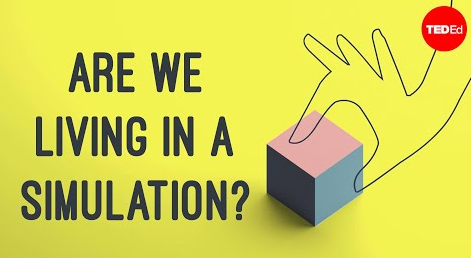We live in a vast universe, on a small wet planet,
我们生活在广阔宇宙中的一个潮湿的小星球上,
where billions of years ago single-celled life forms evolved from the same elements as all non-living material around them,
早在数十亿年前,单细胞生命形式就从与其周围的非生命物质相同的元素中演变出来,
proliferating and radiating into an incredible ray of complex life forms.
并不断繁衍和发展出大量的复杂生命形式。
All of this -- living and inanimate, microscopic and cosmic -- is governed by mathematical laws with apparently arbitrary constants.
无论其有无生命、微观的还是庞大的,所有这一切都明显受到任意常量的数学法则的支配。
And this opens up a question: If the universe is completely governed by these laws, couldn't a powerful enough computer simulate it exactly?
这就提出了下面的问题:如果宇宙完全受这些法则支配的话,那么,功能强大的计算机难道不能完全模拟它吗?
Could our reality actually be an incredibly detailed simulation set in place by a much more advanced civilization?
我们的现实世界是否真的是被更先进的文明所设定出来的精细模拟呢?
This idea may sound like science fiction, but it has been the subject of serious inquiry.
可能该想法听起来像科幻,但它已成为严肃研究的主题。
Philosopher Nick Bostrom advanced a compelling argument that we're likely living in a simulation, and some scientists also think it's a possibility.
哲学家尼克·伯斯特罗姆提出了令人信服的论点,即我们很可能生活在一个模拟中,而一些科学家也认为这是可能的。
These scientists have started thinking about experimental tests to find out whether our universe is a simulation.
这些科学家已经开始考虑进行实验测试,以发现我们的宇宙是否为模拟的。
They are hypothesizing about what the constraints of the simulation might be,
他们假设了模拟的可能约束条件,
and how those constraints could lead to detectable signs in the world.
以及这些约束条件可能如何在世界上产生可检测的迹象。
So where might we look for those glitches?
那么,我们去哪里找寻这些蛛丝马迹呢?
One idea is that as a simulation runs, it might accumulate errors over time.
一个想法是,随着模拟的进行,随着时间的推移,错误可能会被积累。
To correct for these errors the simulators could adjust the constants in the laws of nature.
为了纠正这些错误,可调整模拟器自然法则中的常量。
These shifts could be tiny -- for instance, certain constants we've measured with accuracies of parts per million have stayed steady for decades,
这些变化可能很小--例如,我们用百万分之几的精度所测量的某些常量已经稳定了几十年,
so any drift would have to be on an even smaller scale.
因此,任何偏离都控制在较小范围内。
But as we gain more precision in our measurements of these constants, we might detect slight changes over time.
但随着我们对这些常量测量精度的提高,随着时间推移,我们可能会发现那些细微变化。
Another possible place to look comes from the concept that finite computing power, no matter how huge, can't simulate infinities.
从有限计算能力的角度,另一个可能需要关注的概念是:即无论多大的有限计算能力都无法模拟无极限的东西。
If space and time are continuous,
如果空间和时间是连续的,
then even a tiny piece of the universe has infinite points and becomes impossible to simulate with finite computing power.
即使宇宙极小的一部分也具有无限的点组成,无法用有限的计算能力进行模拟。
So a simulation would have to represent space and time in very small pieces.
因此,模拟必须以非常小的片段来表示空间和时间。
These would be almost incomprehensibly tiny.
微小到几乎难以理解。

But we might be able to search for them by using certain subatomic particles as probes.
但是,我们或许能够寻找它们,通过使用某些亚原子粒子作为探针。
The basic principle is this: the smaller something is, the more sensitive it will be to disruption
基本原理是:物体越小的话,对干扰就越敏感,
think of hitting a pothole on a skateboard versus in a truck.
试想地面坑洼对驶过的滑板和卡车的不同影响。
Any unit in space-time would be so small that most things would travel through it without disruption
时空中的微粒都特别小,以至于多数物体都不受干扰地通过,
not just objects large enough to be visible to the naked eye, but also molecules, atoms,
不仅是肉眼可见的大物体,还有分子、原子,甚至电子,
and even electrons and most of the other subatomic particles we've discovered.
以及我们已发现的其它多数亚原子粒子也不受干扰。
If we do discover a tiny unit in space-time or a shifting constant in a natural law, would that prove the universe is a simulation?
若我们确实在时空中发现了一个微小单位,或者在自然定律中发现了一个移动常量,那是否就证明了宇宙就是一个模拟世界?
No -- it would only be the first of many steps.
不--这只是许多步骤中的第一步。
There could be other explanations for each of those findings.
其中任意一个发现可能还有其它解释。
And a lot more evidence would be needed to establish the simulation hypothesis as a working theory of nature.
而且,作为一个有效运行的自然理论,建立这个模拟假设需要更多的证据。
However many tests we design, we're limited by some assumptions they all share.
无论我们设计了多少种测试,都受到了一些假设的共同限制。
Our current understanding of the natural world on the quantum level breaks down at what's known as the planck scale.
我们目前对量子水平自然界的理解不适用于普朗克尺度。
If the unit of space-time is on this scale, we wouldn't be able to look for it with our current scientific understanding.
如果时空单位基于普朗克尺度,那么,我们将无法按当前的科学理解来寻找它。
There's still a wide range of things that are smaller than what's currently observable but larger than the planck scale to investigate.
仍然有大量的比我们目前能观察到的小,但大于普朗克尺度的东西需要我们去探究。
Similarly, shifts in the constants of natural laws could occur so slowly that they would only be observable over the lifetime of the universe.
同理,自然定律常量的变化可能发生得太过缓慢,以至于只有在宇宙的整个生命周期中才能观察到。
So they could exist even if we don't detect them over centuries or millennia of measurements.
因此,即使我们在几个世纪或几千年的测量中没能发现它们,它们也可能是存在的。
We're also biased towards thinking that our universe's simulator, if it exists, makes calculations the same way we do, with similar computational limitations.
如果宇宙模拟器存在的话,我们还偏向于认为其运算方式与我们相同,即具有类似的计算限制。
Really, we have no way of knowing what an alien civilization's constraints and methods would be -- but we have to start somewhere.
确实,我们无从知晓外星文明的约束条件和方法,但我们必须从某个地方着手研究。
It may never be possible to prove conclusively that the universe either is, or isn't, a simulation,
可能最终都永远无法证明宇宙是否为模拟的,
but we'll always be pushing science and technology forward in pursuit of the question: what is the nature of reality?
但我们将一直推动科技发展去追寻这个问题的答案:现实的本质是什么?












